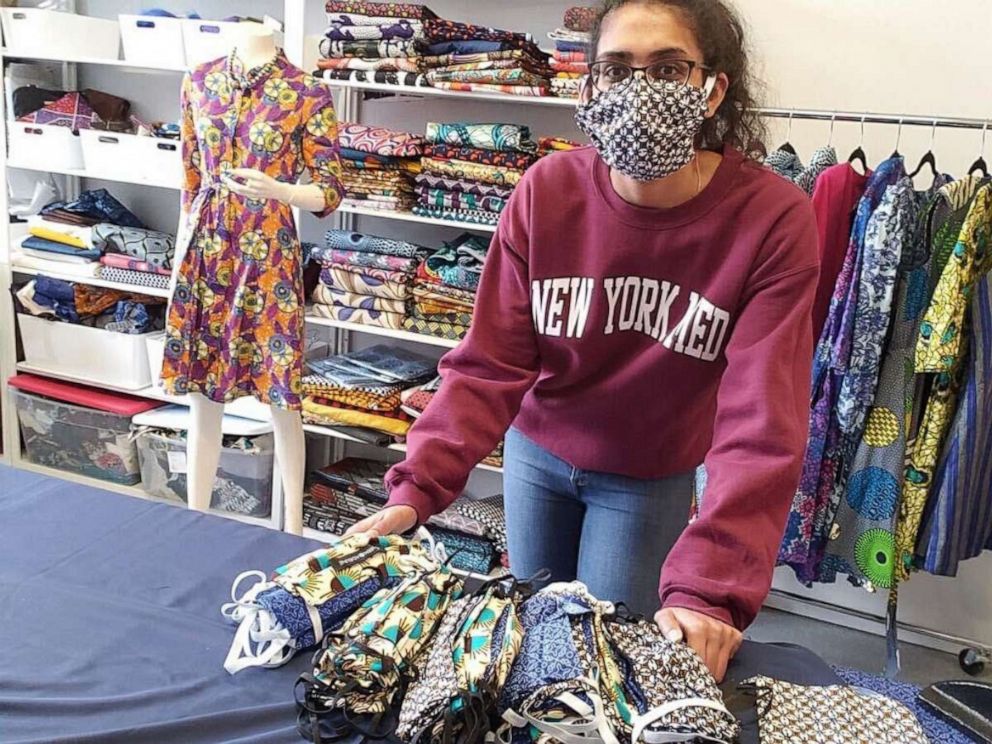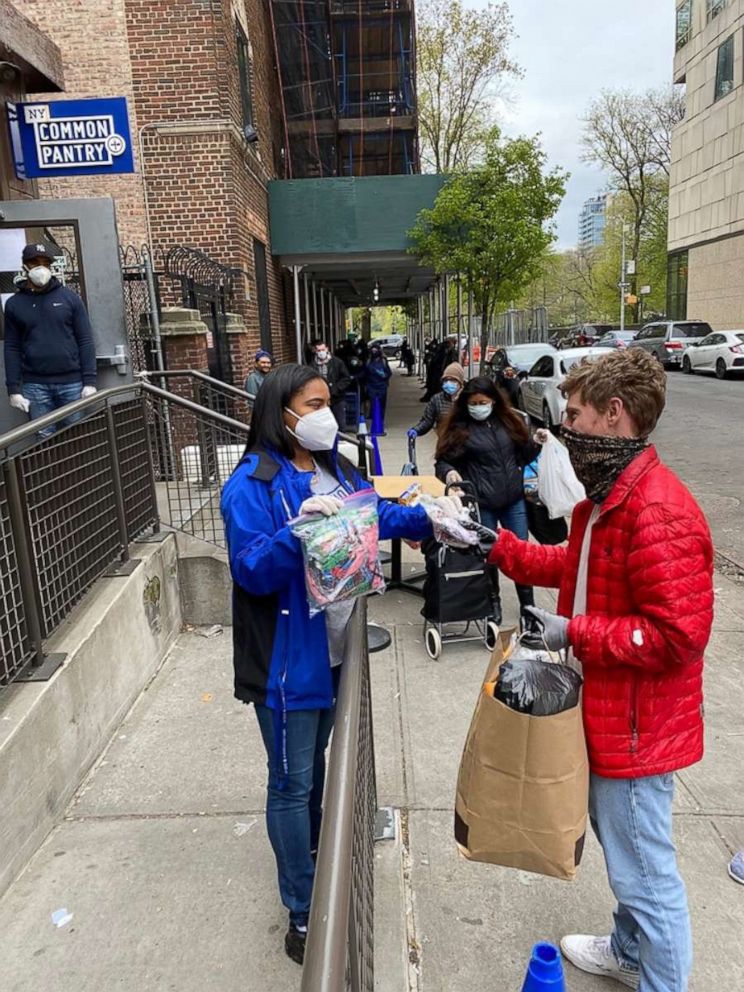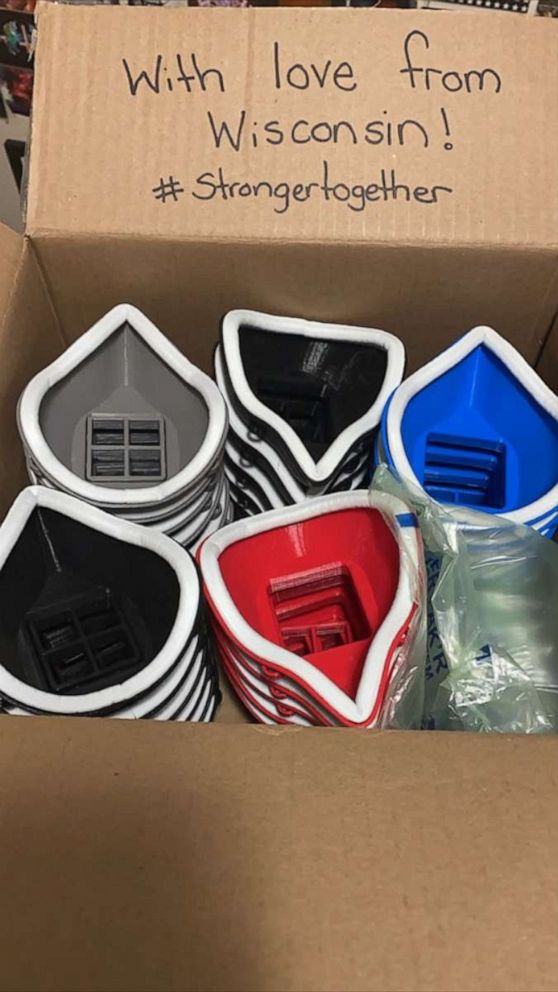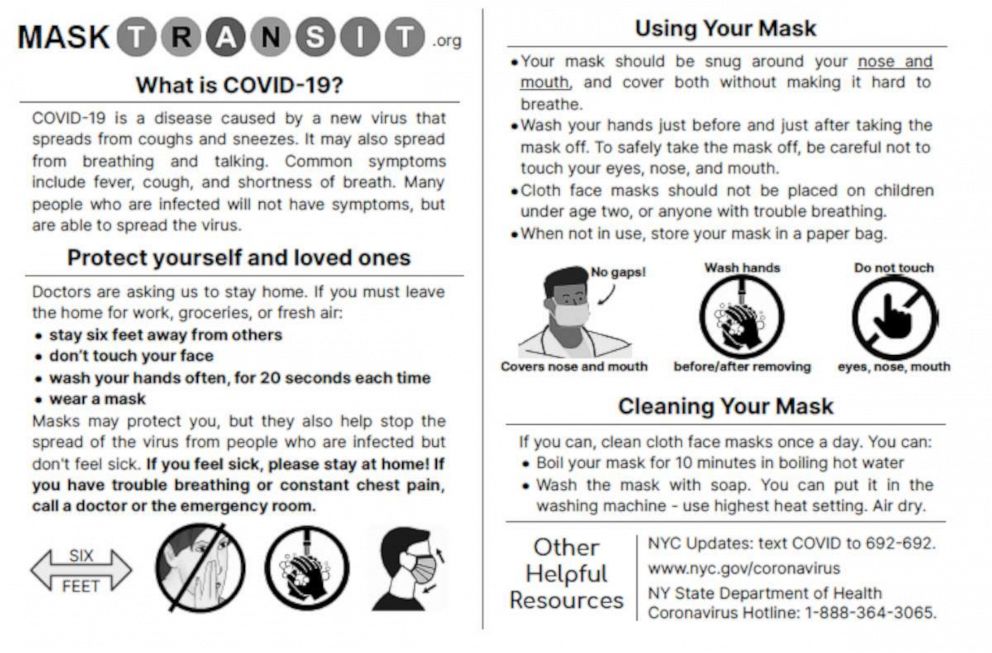Mount Sinai medical students give free masks to those in need
Mask Transit members have donated 5,000 face coverings.
LSA Family Health Service needs face masks. The nonprofit employs frontline workers through its visiting nurse service and weekly food pantry in Manhattan's East Harlem. It has also heard from the families it serves that they need masks. Because of this, the organization recently connected with Mask Transit, an initiative founded by Mount Sinai medical students that gets masks to vulnerable communities.
After receiving donations from Mask Transit, LSA will be delivering some 400 adult and children's masks alongside food pantry items to households this week. It will also have a reserve to protect its staff and volunteers.
"It's been amazing to see just all the generosity... to help get the things that are needed for our families to help them stay healthy or isolated, or to [help them] protect themselves," Ray Lopez, the director of programs and environmental health at LSA, told ABC News. "A lot of our families in East Harlem are living in overcrowded apartments. A lot of them have already gotten sick. It's still circulating within our neighborhood."

Mask Transit is one of several organizations providing frontline workers and the public with masks amid personal protective equipment shortages.
The Centers for Disease Control and Prevention (CDC) recommends wearing face coverings in public, when social distancing is hard to maintain, to help slow the spread of COVID-19. Some states require residents or employees to wear them as part of their stay-at-home or phased reopening measures.
Mask Transit was founded a little over a month ago by a rising fourth-year medical student at Manhattan's Icahn School of Medicine at Mount Sinai. Since then, it's grown to a team of 50 student volunteers across 10 institutions in three cities -- New York, Boston and New Haven, Connecticut.
The group is focused on distributing masks to underserved populations, including essential workers, the homeless and people of low socioeconomic status. Its efforts follow reports about how COVID-19 is disproportionately affecting people of color and residents living in high-poverty areas around New York City, the epicenter of the pandemic in the U.S.
Data released last month from the city's health department found that black residents are dying from the coronavirus more than any other racial group. An NYU analysis also released last month found that the strongest neighborhood factors linked to high COVID-19 rates in New York City were: having a large share of black and Hispanic residents, having a high proportion of overcrowded apartments and having a large share of residents without college degrees.
"We realized that there were a lot of disparities that COVID-19 was perpetuating and worsening," Aishwarya Raja, founder and director of Mask Transit, told ABC News. "We realized that there was a real need to get out into the community and try to decrease this gap that COVID-19 was creating."

In addition to LSA, Mask Transit has partnered with organizations including NY Common Pantry (in East Harlem and the Bronx), Mount Sinai Human Rights Program (which assists asylum seekers), Bergen Mask Task Force (aiding NJ Transit frontline workers) and Boston Healthcare for the Homeless Program. It has also distributed masks through student-run free clinics in East Harlem and New Haven.
So far, Mask Transit has given out 5,000 free masks that it's received through donations. Packaged with the masks are physician-reviewed educational materials on COVID-19 precautions and mask use instructions.

The documents are available in multiple languages and across all literacy levels to increase accessibility so that "once it's in the hands of people, they can make good use of it," Parth Trivedi, a rising fourth-year medical student at Icahn School of Medicine at Mount Sinai (who helped draft the materials), told ABC News. "There's some unique, both general and health literacy dimensions that need to be taken into consideration whenever one is seeking to engage the undomiciled, or homeless, community."
The materials distill recommendations, from the likes of the CDC and the World Health Organization (WHO), on using and cleaning masks, and on other measures to avoid contracting COVID-19. The text is written in a fifth or sixth-grade reading level, with minimal medical lingo, and is complemented by images, Trivedi said. There are four black-and-white cards to a page, to require fewer resources to print.

"The difference of having a cloth mask is that you can wash it, but if there's not instructions that go along with it, I don't think it's something that most people do. So, having the instructions along with how to take care of it and make sure it is effective, is very helpful," Colleen Traub, a community health nurse at LSA, told ABC News.
Mask Transit is among several organizations distributing free masks around the city. This month, New York City has given out some 7.5 million free face coverings at city parks, and will continue to do so through Tuesday.
In Connecticut, the joint volunteer efforts Mask for Heroes and Masks for CT have handed out close to 1 million free masks, Judy Alperin, CEO of the Jewish Federation of Greater New Haven, told ABC News.
The center, which has been closed since mid-March due to social-distancing measures, partnered with the grassroots Connecticut group Masks for Heroes about a month ago to get PPE to frontline workers. Masks for CT followed, distributing free surgical masks to the general public at drive-through, walk-up and bike-up events.
The most-recent Masks for CT event, which gave out 60,000 masks on May 5, targeted a section of New Haven that has been "disproportionately affected by this disease," Alperin said. "We certainly saw the community come out in droves."
According to the latest state figures, New Haven County has the second-highest number of confirmed COVID-19 cases by county in Connecticut, with 9,260.
Alperin has been getting requests from all over Connecticut to hold events, and is looking to raise funds to obtain and distribute more masks. The center is also putting materials together so that groups can replicate the Masks for CT events. Alperin hopes to inspire organizations in other states to do something similar.
"I think that it's our responsibility to keep our neighbors, our fellow community members safe," Alperin said. "It's our responsibility as citizens to do that."
What to know about the coronavirus:
- How it started and how to protect yourself: Coronavirus explained
- What to do if you have symptoms: Coronavirus symptoms
- Tracking the spread in the U.S. and worldwide: Coronavirus map
Tune into ABC at 1 p.m. ET and ABC News Live at 4 p.m. ET every weekday for special coverage of the novel coronavirus with the full ABC News team, including the latest news, context and analysis.




